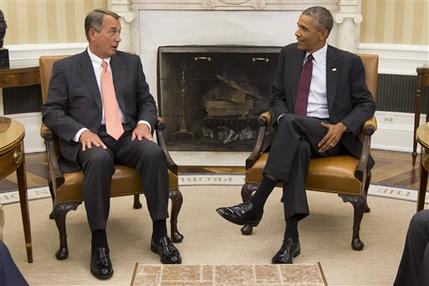 President Barack Obama talks with House Speaker John Boehner of Ohio in the Oval Office of the White House in Washington, Tuesday, Sept. 9, 2014. The president met with Congressional leaders to discuss options for combating the Islamic State. (AP Photo/Evan Vucci)[/caption]
President Barack Obama talks with House Speaker John Boehner of Ohio in the Oval Office of the White House in Washington, Tuesday, Sept. 9, 2014. The president met with Congressional leaders to discuss options for combating the Islamic State. (AP Photo/Evan Vucci)[/caption]A bipartisan majority of House lawmakers have written a letter to President Obama backing up the letter 47 GOP senators controversially addressed to Iran on Monday with dire warnings about the impending nuke deal.
Some 250 members had signed the House letter by Friday afternoon, a clear majority of the chamber.
Its authors, House Foreign Affairs Committee Chairman Ed Royce, R-Calif., and the panel's top Democrat, Eliot Engel of New York, are still gathering more signatures but will send the letter to Obama soon.
"Should an agreement with Iran be reached, permanent sanctions relief from congressionally mandated sanctions would require new legislation," they wrote. "In reviewing such an agreement, Congress must be convinced that its terms foreclose any pathway to a bomb, and only then will Congress be able to consider permanent sanctions relief."
Obama has�shut Congress out�of international talks on limiting Iran's nuclear ambitions and has threatened to veto bipartisan Senate legislation requiring that any deal be submitted to lawmakers for approval. The administration also plans to bypass Congress if necessary in giving Iran relief from sanctions enacted into U.S. law � a key demand from Tehran in the talks, which resume Sunday in Lausanne, Switzerland, ahead of a self-imposed March 24 deadline to agree on a framework for a final deal.
The president's stiff-arming of Congress prompted the Republican senators' letter, which angered Democrats but does not appear to have slowed efforts by Senate Foreign Relations Committee Chairman Bob Corker, R-Tenn., to build a veto-proof majority for his bill.
Royce and Engel's letter notes that lawmakers want answers to "grave and urgent issues" that have arisen in the talks, such as Iran's lack of cooperation with International Atomic Energy Agency inspectors seeking answers about reports that Tehran once tried to develop a nuclear weapon and Iran's role in supporting terrorism and insurgencies in countries such as Yemen.
The panel has summoned Deputy Secretary of State Anthony Blinken to a hearing Thursday to address those issues.
By Washington Examiner










